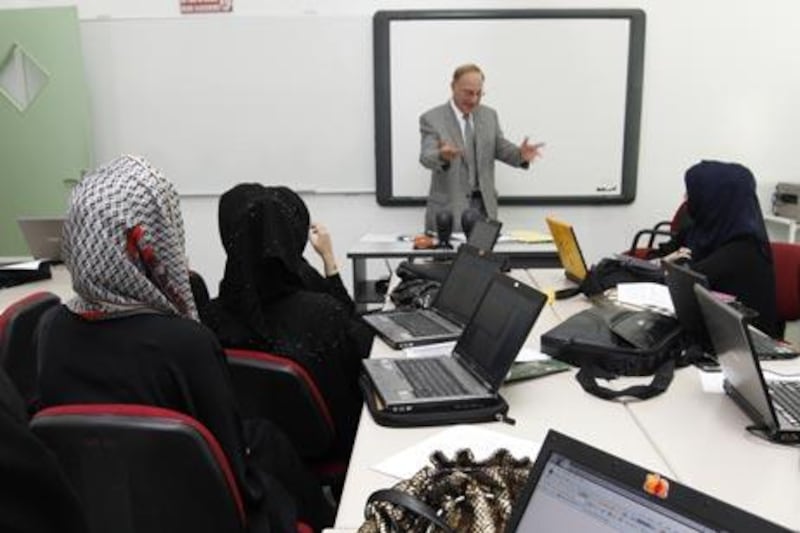ABU DHABI // Two federal universities have tens of millions of dirhams of deficit and debt as well as overdraft borrowing, according to an FNC report.
The Higher Colleges of Technology (HCT) had a budget deficit of at least Dh110 million in 2009, and Zayed University owes Dh33 million in unpaid electricity and water bills to authorities in Abu Dhabi and Dubai, the report says. It provides an insight into the finances of the federal universities, including the high cost of foundation English programmes, which some are trying to phase out.
Many students at federal universities have to take the foundation courses to improve their English to degree-course standard. Zayed University spent more than Dh104 million on its foundation programme between 2007 and 2009.
The figures in the FNC report were compiled by the State Audit Institution along with a number of bodies, including HCT and Zayed University themselves.
The report, by the FNC's financial affairs committee, analysed federal spending by a range of government bodies in 2009. It is intended to inform the FNC's debate on the federal budget, scheduled for December 28. The HCT and Zayed University budgets for 2011 have been frozen at the 2010 figures of Dh736 million and Dh321 million respectively.
The report said the HCT had paid nearly Dh4 million in rent for an entire apartment building in the capital that it never used. The HCT replied that it leased the building because it expected to have to accommodate an increased number of students during a housing shortage, and the building was fully occupied by the beginning of the 2009 academic year.
Auditors also said the HCT gave pay increases to senior directors that exceeded its own salary limits.
The Colleges said they awarded the increases to senior directors with many years' service, based on a university decision placing no limits on the salaries of such officials.
The HCT also failed to collect nearly Dh23 million in revenue over several years for services it provided jointly with research and other institutes, and had to obtain a bank overdraft to cover the cost of admitting more students during the 2009-2010 academic year.
The university owed more than Dh7 million in interest payments on the overdraft in 2009. It said it wanted to avoid such problems but found itself “forced to this to cover its costs, especially the salaries and benefits of its employees”.
The FNC report said the HCT had a budget deficit of Dh183 million in 2009. The HCT disputes the figure. It says the deficit was less than Dh120 million, and a surplus the previous year reduced it to around Dh110 million.
The HCT’s funding problems were the subject of a separate FNC report last month. During a debate in the chamber, Sheikh Nahyan bin Mubarak, the chancellor of HCT and Minister of Higher Education and Scientific Research, said the frozen budget was the source of the HCT’s “deficiencies”.
Zayed University exceeded its budget for 2009 by Dh33.3 million, but it raised additional revenue of roughly the same amount.
The university said the reason for its overspending was an increase in the number of students. It added that “it was possible to avoid overspending by speeding up the implementation of the funding mechanism based on the principle of student cost”.
The Government eventually supplemented Zayed University’s budget with more than Dh41 million in early 2010, a sum based on the number of students.
The university owes more than Dh33 million in unpaid electricity and water bills to the Abu Dhabi Water and Electricity Authority and the Dubai Electricity and Water Authority, the FNC report said.
The university says it is negotiating with the two government bodies to waive the utility bills because it does not have enough money in its budget to pay them.
In addition, the university has not collected Dh42 million in fees owed by a range of unnamed institutions up to 2009. It replied that it had collected roughly half of these fees.
The university also spent Dh1.9 million on academic textbooks in 2009.
The Ministry of Finance says financial assistance from the Government is based on the size of the student body. Despite the HCT having the largest student body, the university complex receives the second highest budget allocation for federal colleges after UAE University.
The federal budget is allocated for three years, so the universities’ budgets are unlikely to increase between 2011 and 2013.







